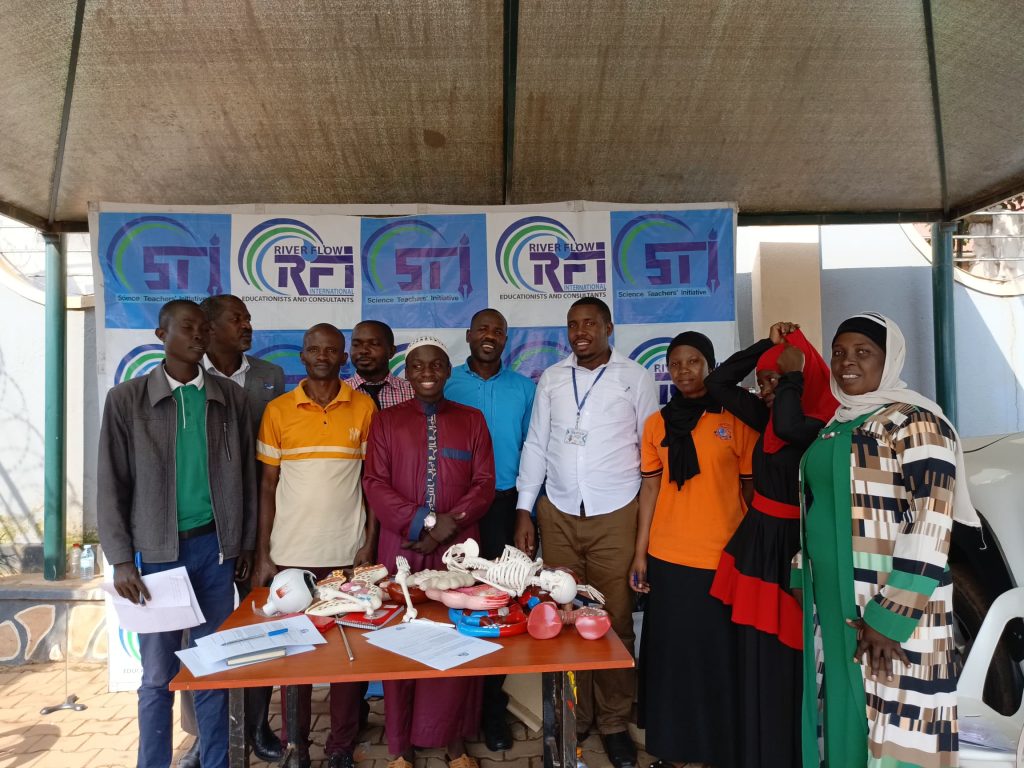
In a rapidly evolving educational landscape, practical science education has become critical to developing well-rounded learners. River Flow International has invested in science kits that have proven invaluable tools in teaching core scientific concepts to bridge the gap between theoretical learning and hands-on experience. In line with this, Ndejje Quality Schools recently held a comprehensive training for its science teachers, focusing on the effective usage of science kits in classrooms. This training aimed to equip teachers with the necessary skills and techniques to maximize the potential of these kits, thereby enhancing learners’ understanding of science through practical learning.
The Importance of Science Kits in Education
Science kits offer learners the opportunity to engage in hands-on experimentation, making abstract concepts more tangible and easier to understand. These kits typically contain materials and instruments for conducting experiments related to physics, chemistry, biology, and other science subjects. By allowing learners to actively participate in experiments, science kits reinforce theoretical knowledge and foster critical thinking, problem-solving, and collaboration skills.
At Ndejje Quality Schools, the integration of science kits into their curriculum aligns with the institution’s commitment to delivering high-quality, practical education. Recognizing that the success of this approach hinges on the proficiency of the teachers, the school organized a specialized training session to ensure that their teachers could effectively use the materials in the kits from River Flow International (RIFI).
The training was efficacious because science teachers gained hands-on skills in using science kit items and were able to demonstrate confidence and understanding by developing science lesson plans while integrating the items in the science kit.
Through feedback forms, teachers committed to using the science kit items to teach primary integrated science at Ndejje Quality School practically while helping learners to apply knowledge.
Since 2011, RIFI has been committed to improving the quality of education in Africa by stimulating a sense of critical thinking among young people in Africa living in indigenous (mainstream), vulnerable, and host communities in Africa.
RIFI has been doing this through the practical approach of teaching and learning for skills development. Through this approach, RIFI has been and still develops unique practical instructional materials (Games for Learning Kits, Primary Science Kit, O’Level Competence Science Learning Kit, ECD Literacy and Numeracy Kits, Learner’s Practical Manuals and Teacher’s Guides, and Laboratory Instruction Manuals), promoting literacy and Numeracy, tailored teacher capacity building, ICT integration in teaching and learning, mainstreaming healthy messages in education (in concerns of HIV/AIDS control and prevention, Malaria control and prevention, Child Protection, Environmental Protection, Child Safety, Personal and Menstrual Hygiene, and Adolescent Management), Youths skilling and livelihoods, Competence-Based teaching and Learning.
Training Highlights
The hands-on training provided teachers with practical experience in using the science kits. Here are some highlights of the session:
- Demonstration of Key Experiments Teachers participated in guided demonstrations of key experiments, covering topics such as electricity, magnetism, chemical reactions, and biological processes. By performing these experiments themselves, teachers gained confidence in using the kits and were able to troubleshoot common challenges that might arise in the classroom.
- Experiment Customization One of the key aspects of the training was showing teachers how to adapt the experiments to different learning levels. Whether they were teaching younger learners or preparing older learners for national exams, teachers learned how to modify the complexity of experiments to suit their students’ needs. This flexibility is crucial for ensuring that all learners, regardless of their prior knowledge, can benefit from the practical experience.
- Encouraging Learners Participation A central focus of the training was on how to make science lessons more interactive. Teachers were encouraged to involve learners in setting up experiments, making predictions, recording results, and discussing outcomes. This approach promotes active learning and deepens learners’ engagement with scientific concepts.
- Linking Theory to Practice The science kits provided the perfect opportunity for teachers to reinforce theoretical concepts taught in class. During the training, teachers were shown how to directly connect textbook material with hands-on activities, making the learning experience more cohesive and effective for students.
- Collaborative Learning Environment The training fostered a collaborative atmosphere among the teachers, allowing them to share insights and best practices. By working together, teachers were able to exchange ideas on how to overcome challenges and make the most of the science kits in their classrooms.
Benefits of the Training for Ndejje Quality Schools
This training program is expected to have a significant impact on both teachers and learners at Ndejje Quality Schools. For teachers, the knowledge and skills gained from the training will enhance their confidence and ability to deliver engaging, practical lessons. In turn, learners will benefit from a more hands-on, inquiry-based approach to learning science, which will help them develop a deeper understanding of key scientific concepts.
Additionally, the use of science kits in the classroom can spark curiosity and a passion for science among learners, potentially inspiring future careers in STEM (Science, Technology, Engineering, and Mathematics) fields. The training ensures that learners will have a more enriching learning experience, as teachers are now better equipped to use the kits as tools for exploration, discovery, and innovation.
